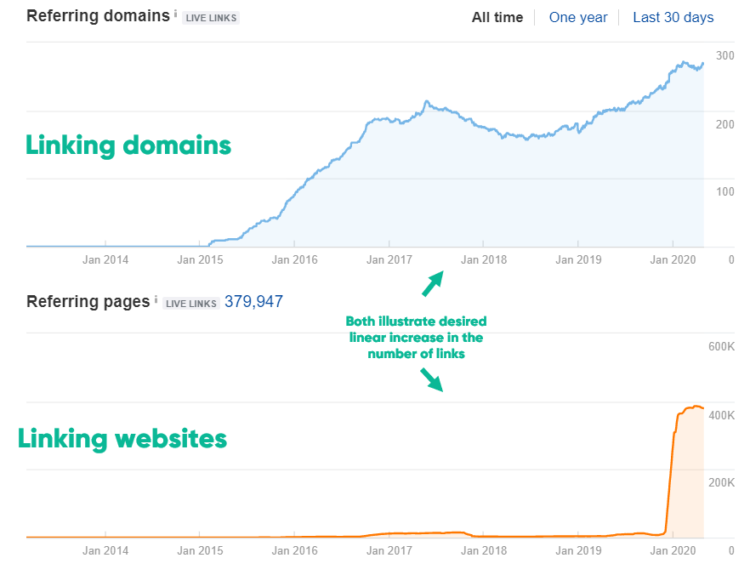What Is SEO Audit?
When it comes to SEO, an SEO audit is a basic document necessary to start cooperation between a website owner and an SEO agency. The audit serves two main purposes. First of all, it helps to examine different aspects of the website. Second of all, the client, as a recipient, may expect that the SEO company will use the audit to seize specific opportunities and steps that will be taken to improve the site’s results and to increase traffic.
An SEO audit aims at identifying as many issues that affect the website visibility in the organic search results as possible. With its use, you can easily determine:
● Technical problems of the site
● All page indexing issues
● Problems with the website structure
● Any issues related to UX
● Problems with the website content and its development
● The way the page looks in the search results
● Information on competition in the search engine
An audit is a standard procedure that highly affects the website – it’s an examination that enables scrutinizing the condition of the page.
How to Conduct an SEO Audit?
If any of your activities that aimed at increasing traffic to your site didn’t bring satisfactory results, then, there’s a huge probability that you forgot to pay attention to a few very important elements. The adopted SEO strategy and activities you’ve performed may not be the most optimal for your site. Or perhaps, users attracted by your offer don’t constitute your real target group and aren’t interested in your services or products. Verifying all areas of website operation requires conducting a thorough SEO audit that can be performed by a professional SEO agency or an independent specialist.
Start auditing your website with our free SEO audit checklist!
The ABC of SEO – Basic Elements of Every SEO Audit
An SEO audit should provide you with basic information about the website, including the history of the domain, its age as well as an exact date from which the discussed page has been functioning on a given domain.
These pieces of information are essential to plan any SEO activities as the history of the domain, its age and linking data affect the position of the site in the search results. Moreover, they have an impact on the website image and its perception by Google robots. Various keyword monitoring tools may display remnants of past SEO activities and lead to huge inconsistencies when it comes to types of keywords that a given website is displayed on. For example:
What Data Should Be Included In an SEO Audit?
Competitive Search Engine Analysis
Analyzing your competition in Google is an important and useful part of an SEO audit. It allows you to estimate how much work needs to be done to optimize your website and catch up with leaders of given keywords. It involves examining keywords chosen by your market rivals, estimated monthly traffic coming from the search engine, backlinks, domain authority as well as linking domains. The competitive analysis enables you to determine the difficulty of keywords. If it turns out that given keywords are characterized by high competitiveness (imagine competing with eBay, Wikipedia, or Microsoft) this analysis may also trigger you to rethink your SEO strategy and choose different phrases.
However, it needs to be remembered that your competition in Google doesn’t equal your market rivals. So for example, a subpage on Wikipedia dedicated to a particular technology may be a search engine competitor for a high-tech shop.
Indexing and Accessibility In Search Engines
There is probably nothing worse than finding out that your website is blocked on Google, therefore, checking the indexing and accessibility of the site are basic elements of an SEO audit.
If your website isn’t particularly big, you can easily check its indexing manually by typing “site:www.websiteaddress.com” into the search engine. This way, you’ll see all indexed subpages. On the other hand, if your site is more complex, you can check its indexation with the use of Google Search Console. This tool allows you to thoroughly analyze your site indexation, verify individual links manually, or request the page to be indexed.
It’s also worth taking a closer look at the robots.txt file to check what’s blocked by robots and to see the site map and ensure whether it meets all relevant protocols.
Meta Tags Analysis
Meta tags are used to describe website content. Optimizing them is an essential step of every SEO process and their improper application may result in a decrease in the website’s position in the search results. That’s why an SEO audit performed at the very beginning of every SEO process should include a thorough analysis of all meta tags on the site.
Meta tags include:
● Title
The title element isn’t a part of meta tags, however, due to its importance, it’s often discussed with other meta tags. As you can see in the example below, the content of the <title> tag is displayed in the search results as the title of the website. It should be from 50 to 60 characters long. The title element on the home page and every other subpage should include their most important and characteristic keywords.
● Meta description
The <description> tag describes the content of the page. It should be from 150 to 160 characters long. The meta descriptions should include keywords that are the most characteristic of given subpages and CTA (Call to Action). Although meta description doesn’t affect the position of your site in the search results, structuring it properly may encourage users to visit your website and consequently improve your click-through rate. The description is displayed in the search results under the title and URL of the website, as can be seen below:
● Keywords
The <keywords> tag contains keywords and phrases that briefly summarize the content of the website. Today, keywords don’t affect the SEO process, although in the past they were considered to be one of the most important elements. It isn’t obligatory to include them on individual subpages, however, adding a few keywords while optimizing product pages will certainly make it easier for Google robots to identify them and provide users with more accurate search results. Remember that keyword stuffing may be treated as manipulation and may negatively influence the position of your website in the search results.
● Headers
Headers help divide texts into sections. They should include the most important keywords characteristic of particular subpages. An SEO audit can help you verify whether your site has a proper header structure (see the diagram below). Remember about optimizing H1 and H2 headers as they have the highest impact on the SEO process.
● <strong> and <em>
The <strong> and <em> tags are used to highlight keywords in the text. You can bold your text with the use of the <strong< or <b> tag and apply italics with the <em> or <i> tag. However, there is a difference. Content highlighted with the use of <strong> and <em> tags is recognized as more important by Google robots while <b> and <i> tags give only visual effects. Using <strong> and <em> tags has a positive impact on the SEO process.
An SEO audit should help you determine whether proper keywords are highlighted in inappropriate places and whether everything is consistent. Additionally, the audit is also useful in verifying whether there’s no keyword stuffing. Using too many keywords in relation to the whole text can be perceived as artificial and Google may decide to lower your position in the search results.
● Alt
The <alt> attributes are alternative image descriptions. They’re very important elements of every website as they make it possible to find out what’s the content of images in situations when photos aren’t loaded properly. Moreover, they also make it easier for visually impaired people to browse the net. Special modules read the content of the <alt> attributes to blind people, therefore, it’s essential to ensure that you place only quality texts there.
Alt descriptions are one of Google ranking factors, that’s why they should contain the most relevant keywords, as in the case of other meta tags.
When conducting an SEO audit, you should check whether all pictures on your website have alt tags and whether they’re filled incorrectly.
To find out more about meta tags, go to one of our previous articles: Meta tags – what are they and how do they affect SEO?
Responsive Web Design and Mobile-Friendliness
When conducting your website audit, you should definitely analyze whether your site is suitable for mobile devices. Nowadays, most users browse the net with the use of smartphones or tablets. Consequently, Google decided to put more emphasis on this aspect and introduced the so-called Mobile-First Index. It aims at encouraging website owners to create pages that are displayed well on both mobile and desktop devices.
Responsive web design and being mobile-friendly are other Google ranking factors. Websites that have problems with their mobile-friendliness are penalized and displayed lower in the search results. That’s why any SEO audit shouldn’t lack information about the mobile-friendliness of the page. If you want to learn more, read our blog post: Mobile-First Index – what is it and how does it affect SEO?
URL Analysis
Checking whether all your URLs are correct is another essential step of an SEO audit. A proper URL structure makes browsing the website easier for both users and search engine robots. If you use meaningful expressions instead of some random words, Google will certainly appreciate it and display your site higher in the search results. To learn more about building ULRs, visit our blog: URL structure – how to build a user and robot-friendly link?
Evaluation of Website Content
The analysis of website content is another key element of an SEO audit. Check whether your texts help you advertise the business and whether they’re optimized for keywords. Are there any problems with your website content?
A thoroughly conducted SEO audit should answer all the abovementioned questions. Analyzing your content from the perspective of both users and search engine robots will help you devise a proper strategy that will allow you to improve your positions in the search results.
On our blog, you can find a detailed guideline explaining how to properly conduct a content audit.
Duplicate Content Analysis
As we’re talking about website content, it’s necessary to check the duplication rate on your site. Attracting users’ attention and being ranked high in the search results is possible only thanks to the creation of unique and top-notch texts with the most relevant keywords.
To find out more, read our blog entry: Content duplication. How to deal with this issue?
Keyword Analysis
SEO can be briefly defined as a fight for being displayed high on valuable keywords. A properly performed SEO audit should definitely analyze keywords and provide you with information about phrases and positions on which your website is displayed in the search results. Moreover, you should also learn which key phrases generate traffic to your site.
Backlinks Analysis
Creating a database of backlinks is an important part of the SEO activities performed on the site. On our blog, we’ve discussed several effective methods of obtaining quality links which can improve the position of your website in the search results.
If you decide to hire an agency to conduct an SEO audit for you, you’ll be probably provided with backlinks analysis performed in tools such as Ahrefs, Woorank, Moz, or Site Analyzer.
The audit should also indicate the number of links and domains leading to your website as well as their quality. Moreover, you should also get a chart depicting the increase in domains and backlinks. Of course, it’s advisable to aim at a steady growth and at the same time avoid some random fluctuations.
Website Loading Speed Analysis
It’s been known for a long time that website loading speed is one of Google ranking factors. That’s why it’s essential to ensure that your site loads as quickly as possible. There are numerous tools that can check your website loading time and provide you with useful tips on how to improve the result. Google PageSpeed Insights is definitely the most popular one.
Remember that website loading speed is important not only for Google robots but also for users who often decide to leave the site if it doesn’t load quickly enough. This, in turn, leads to an increase in the bounce rate. To find out more about it, go to our article: What discourages customers of online shops – how to reduce bounce rate?
Analysis of Graphics and Photos Optimization
While discussing meta tags we’ve already mentioned how important it is to properly optimize alt attributes which are used to describe the content of the graphics. An SEO audit should include a thorough analysis of photos optimization. Apart from checking whether alternative descriptions are filled in properly, it should also examine elements such as image sizes, resolution, names or file extensions. Improper parameters can slow down the website loading time. If you want to learn more about image optimization, visit our blog: Images vs. SEO. How to get down to it?
Social Media Activity Analysis
Being active on social media can constitute a valuable source of obtaining links and building relationships with potential customers, therefore, it’s fully reasonable to expect that performing an SEO audit will provide you with information about social media accounts that link to your website. Additionally, the audit should also give you some hints on how to improve your brand recognition on social media and which portals are particularly significant when planning SEO activities.
What About Back-End?
A proper SEO audit should also include recommendations for webmasters. An SEO agency that takes care of your site can ask web developers to implement certain improvements that may contribute to better functioning of your page. It’s a good idea to, for example, use pictures of lower quality to boost your website loading speed which, as we’ve already mentioned, is one of Google ranking factors.
Is It Necessary To Perform SEO Audit?
Conducting an SEO audit is recommended as it enables the creation of a report on the current condition of the website and a plan of steps that will be taken by the agency. This document makes it easier for you to control whether the agency fulfills its obligations and whether all activities indicated in the audit are performed properly.
When to Conduct the audit?
To be honest, you can conduct the audit whenever you want as there are no restrictions. However, there are a few situations in which performing an SEO audit is a must. Below you can find a list of the most important ones:
Creation Of a New Website
Already at the stage of designing your website, it’s worth consulting its project with an SEO specialist that will suggest to you what are the key elements of the site that have the greatest influence on the further SEO activities. Conducting an SEO audit of the website mockup will allow you to prevent many mistakes that could have a negative impact on the position of the site in the search results in the future. It’ll also indicate additional possibilities to improve the page and achieve high positions on Google.
Note that it’s necessary to conduct another website audit after the page is created (this is also the moment when most companies decide to perform it) as this time you’ll be able to examine your website with the use of specific tools. At this stage, you can discover irregularities such as keyword stuffing or improper meta tags optimization.
A Decrease in The Visibility Of The Site
The positions of websites may be lowered for many reasons and sometimes it’s difficult to determine the exact cause. If Google robots decide that your website has too much duplicate content then they may rank it on lower positions. The situation is very similar in the case of algorithm updates or seasonality. Conducting an SEO audit will undoubtedly help you to determine why the visibility of your website has deteriorated and what steps can be taken to solve the issue.
Redesign Or Refreshment Of The Website
Older websites should be updated on a regular basis as applied solutions turn out to be outdated and the published content doesn’t attract users anymore. If you decide to refresh or redesign your website, don’t forget about conducting an SEO audit both before and after introducing the changes. These changes may concern any modifications of the site’s layout as well as changes of the domain or expansion of the website’s structure.
This time, an SEO audit will help you evaluate how implemented changes affected the website and what can be done to develop it even more and avoid making mistakes. A thorough analysis is also useful in selecting appropriate keywords that can improve the visibility of the modified website in the search results.
Cooperation with SEO Agency
An SEO audit should also be performed if you decide to start cooperation with an SEO agency. Conclusions and relevant data obtained thanks to a thorough examination are helpful in devising a proper strategy and planning activities that will attract traffic to the website. Moreover, the report from the audit will give you the possibility to constantly monitor whether the agency you cooperate with employs necessary modifications to the website.
Website Analysis When You Start Cooperation With Another Agency
It’s particularly advisable to conduct an SEO audit if you decide to start cooperation with a different SEO agency. At such a turning point, the audit can be used to determine the current condition and position of the website, its assets, and its weaknesses. Moreover, the report will also provide you with information about activities which have been performed by the previous agency and the steps that will be taken by the new one.
To Sum Up
An SEO audit is a necessary element of every website analysis. People who set up new online stores or start running blogs usually believe that popularity, good writing skills, or quality products are enough to succeed. Unfortunately, it’s not true as there are many other factors that affect website positions in Google.
A properly conducted SEO audit will help you determine faulty elements of your website and the possibilities of improving them. Thanks to it, you can boost the visibility of your site in Google, attract more traffic, and increase your conversion rate.
Have you ever tried to perform an SEO audit on your own? Or maybe you hired a specialist to do it for you? If it helped to improve the position of your website in the search results, share your story in the comments section below!


















